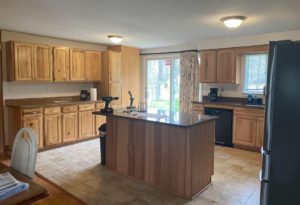 By Yarrow Brown, Executive Director Housing North
By Yarrow Brown, Executive Director Housing North
We know that housing is a challenge across Northwest Michigan. It’s been talked about for years but is growing more dire. Now’s the time for action – to be creative and put new tools to work. To improve the housing system, we all need to be part of the solution.
Housing North is part of the Executive Team leading the Housing Michigan Coalition (HMC). It consists of community, business and government organizations working to increase housing supply and affordability. The goal is to enhance the accessibility and affordability of housing which strengthens communities, supports economic and job growth, and improves outcomes for all Michigan families.
Our focus is to drive consensus policy changes and discussions that lead to positive outcomes this year- in 2021. The Coalition introduced a package of proposed legislation in early February. With widespread support from partners and sponsors, five bills were approved by the state Senate and moved on to the state House. The goal is to have local control, flexibility and a focus on workforce housing.
The proposals allow local governments to determine various terms including affordability, length of tax credits, and to which neighborhoods they can be applied. The bills allow for local decision making in affordability targets up to 120 percent of area median income (AMI) and the term length, allowing these tools to be applied to local conditions and need. They will create opportunities to support projects for people who have difficulty obtaining market-rate housing but have more income than would qualify for “affordable housing.” The goal of the HMC and Housing North is to increase the supply of housing where need is the highest and gaps exist.
What can these bills do to move the needle on housing in our region?
Under the Employer Housing Tax Credit bill, employers can receive an income tax credit equal to 50 percent of their qualified contributions for employees earning up to 120 percent AMI. It includes SB 360 & 361 from Senator Roger Victory, and HB 4649 & 4650 from Rep. Mark Huizenga. Employers will verify that their intended use qualifies – including direct investment in employee housing, rental assistance, down payment assistance and more. They can claim the credit once the funds have been expended for the pre-qualified use. They can also contribute to local Housing Impact Funds that support affordable workforce housing development.
The Payment in Lieu of Taxes (PILOT) bill – SB 432 sponsored by Sen. Wayne Schmidt – allows local governments to negotiate a payment-in-lieu-of-taxes agreement for affordable housing projects that are not tied to a specific program, such as the Low Income Housing Tax Credits (LIHTC).
The Residential Facilities Exemption is SB 322 from Sen. Ken Horn and HB 4647 from Rep. John Roth. It allows local governments to negotiate a 50 percent tax credit on real property taxes if the applicant meets the affordability goals set by local municipalities. The minimum investment is $50,000, and projects must include at least five residential units per parcel, and can include mixed-use development.
Neighborhood Enterprise Zone Expansion (SB 364 from Sen. Jeremy Moss and HB 4646 from Rep. Kyra Bolden), expands the ability to use NEZs to all cities, townships, and villages. The local government sets a district where the tax rate is equal to half the prior year for 6-15 years. This can include homes, condos and mixed-use projects. The bill adds language to promote infill development and prevent incentivizing sprawl. The projects must encourage compact development and contain 5+ units per acre adjacent to existing development, and utilize existing water and sewer infrastructure.
The Attainable Housing & Rehab Act (SB 362 from Sen. Winnie Brinks and HB 4647 from Rep. Terry Sabo) is for rental units only and allows local governments to negotiate a 50 percent real property tax credit. It requires a minimum of 30 percent of units be income restricted, and a minimum $5,000 investment with four residential units or less per parcel. A district can include multiple parcels. Applicants must verify incomes annually.
We are all a part of the solution and while these bills need action by the State House and ultimately the Governor, there are basic things we can do to move forward on housing. We have tools RIGHT NOW for local governments and other partners to incentivize workforce housing, including:
- Cities, villages, townships and counties can provide discounts or waivers on water and sewer hookups for projects with affordable components. Some of those decisions may require policy revisions from the local governments.
- City Councils or elected officials can ensure affordability is locked in for perpetuity – or at least a number of years – through tools including deed restrictions or community land trusts.
- Requiring set-aside units for those experiencing the greatest housing need in our community through collaboration with the Northwest Michigan Coalition to End Homelessness. Up to two units per project could be subsidized and supported using rental assistance dollars for residents making less than 50% AMI.
- Partnerships with Land Bank Authorities, Brownfield Redevelopment Authorities, and Community Land Trusts to help make projects affordable.
- Working with local Downtown Development Authorities to utilize their tax increment financing (TIF) resources.
- Continue working to make all our communities “housing ready” through the Homes for Our Future Campaign (homesforourfuture.org), and the Housing Ready program at Housing North in partnership with local staff, advocates and community members. Call or join now to become an advocate in your community.
We must realize that we’re all part of the solution. When everyone has a safe and healthy home, we will have vibrant and healthy communities. Housing North is a technical assistance resource for communities to reach their housing goals.
To learn more about the Housing Michigan Coalition, visit the website to sign up for Calls to Action. You can also sign up on the housingnorth.org website.







